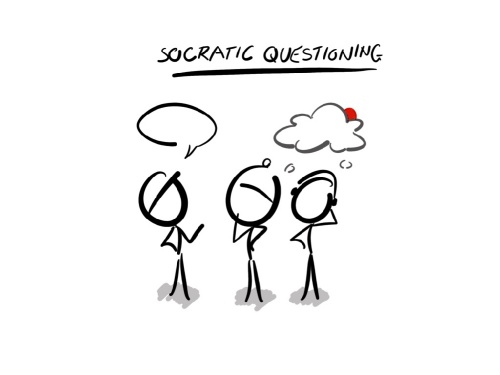Socratic Questioning
Socratic questioning is a form of questioning that enables a participant to reinforce their learning and discover new avenues of reflective enquiry through the answering of well placed, contextual and open ended questions.
Clarification
This aspect enables a coachee to clarify their thinking and explore the origins of their opinions. Examples include
- "Why did you say that?"
- "What do you mean by that?"
- "Can you articulate it clearly?"
- "How did you arrive at this conclusion?"
- "What is the background to this?"
Assumptions
Asking a coachee about their assumptions is intended to raise awareness of any preconceptions, mental models and other bias that may be affecting their understanding. Examples include:
- "What are your assumptions?"
- "What makes you think that?"
- "What have you missed in your conclusion?"
- "What makes you so sure that this is correct?"
- "What bias is included in your understanding?"
- "Why does this assumption still hold?"
Evidence
Challenging the evidence and conclusions is intended to help the coachee raise their awareness of the validity of their evidence and hence, their conclusions. Examples include:
- "What is the basis for your argument?"
- "Can you trust the evidence?"
- "What does the evidence suggest?"
- "What bias has been introduced to the evidence?"
- "What is the underlying evidence for your conclusion?"
Alternatives
Introducing alternative perspectives is intended to help the coachee to explore the problem space further from different view points. Examples include:
- "What is the antithesis?"
- "What is the counter-argument?"
- "If everything went badly, what would happen?"
- "From their perspective, what would they see?"
- "How will this impact them?"
Consequences
Understanding different scenarios and downstream effects may help to understand the surrounding landscape around the problem space. Example include:
- "If things went well, then what would happen?"
- "What would happen in the worst case scenario?"
- "What would be the down stream impact?"
- "How will this affect <...>?"
- "What are the dependencies?"
Question The Question
The intention here is to uncover which aspects were most useful and influential for the final conclusion, and to raise awareness of which elements need to be further analysed.
- "Which question had the greatest impact on you?"
- "Why did this question influence your decision making?"
- "Which question was the most useful to you and why?"
- "Did a question really stand out?"
- "What was it about this question that caused you to think more clearly?"
Laddering
Laddering is traversing the levels of abstractions on a particular line of enquiry to enable new perspectives, ideas and deeper insights to open up new lines of enquiry. Laddering can be done at any point and is most useful to break through a deadlock, and can be in the forms of:
- Chunking up the levels of abstraction by looking at things from a higher or wider perspective
- Chunking down the levels of abstraction by looking at things from a detailed or narrow perspective
Hints and Tips
Approaching questions with a genuine interest in the outcomes from the coachees helps to provide meaningful and insightful questions that are useful rather than using a predefined script that can be superficial, unhelpful and often quite annoying from the coachee's perspective.
Evolving to a two way conversation rather than a strict question and answer exchange can allow for more empathy and insightful questions that are more helpful for the coachee. Impartiality is needed for a coach to use this technique well, where a coach is not concerned with the coachee's answers, as the technique is for the coachee to learn, and a coach can abandon all of their own pre-conceptions and bias.
Not Quite Going To Plan
If a coachee is becoming disengaged or annoyed, then the questioning approach may be too direct, and a softer and more general approach may be more appropriate. As with other coaching techniques, a high degree of trust is needed for this technique to yield good results for the coachee, which can be compromised if the coachee is feeling on the defensive with a barrage of questioning being thrown at them.
See Also
References
- Coaching Questions: A Coach’s Guide To Powerful Asking Skills, Stoltzfus T, 2008
